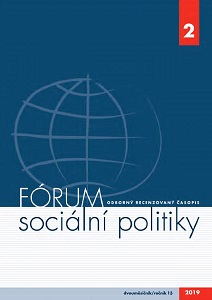Integrační sociální podniky v kontextu potřeb politiky zaměstnanosti České republiky - případ Olomouckého kraje
Integration social enterprises in the context of employment policy needs in the Czech Republic - the case of the Olomouc Region
Author(s): Ondřej Kročil, Miroslav Dopita, Richard PospíšilSubject(s): Business Economy / Management, Civil Society, Labor relations, Welfare systems, Health and medicine and law, Labour and Social Security Law
Published by: Výzkumný ústav práce a sociálních věcí
Keywords: Work-integration social enterprise; employment policy; disadvantaged groups of people; labour market;
Summary/Abstract: Social entrepreneurship is not yet regulated by legislation of the Czech Republic. However, this business approach plays certain role in the Czech economy. According to the database of the Ministry of Labour and Social Affairs, over 200 enterprises of this type are operating in the Czech Republic and fulfill socially beneficial objectives. One of these objectives is employing disadvantaged groups of people in the labour market. In this case, we are talking about so-called work-integration social enterprises. The aim of the research is to define the representation of integration social enterprises among other social enterprises in a selected region of the Czech Republic - in the Olomouc Region, and to determine their potential in the context of the employment policy of the Czech Republic with regard to the needs of the region. To achieve this goal, the authors use the data of 16 enterprises operating in the Olomouc region that are registered in the database of social enterprises of the Ministry of Labour and Social Affairs. The obtained data are apply to the data available from statistics of the Labour Office in the Czech Republic regarding the number of jobseekers from disadvantaged groups in the labor market and vacancies for these persons. The research shows that most of these enterprises fall into the category of work-integration social enterprises, as they focus on employing people disadvantaged in the labour market in the required extent. In this case, dominant group are people with disabilities. At the same time, we identify significant excess of supply over demand for labour of people with disabilities.
Journal: Fórum sociální politiky
- Issue Year: 2019
- Issue No: 2
- Page Range: 2-8
- Page Count: 7
- Language: Czech

